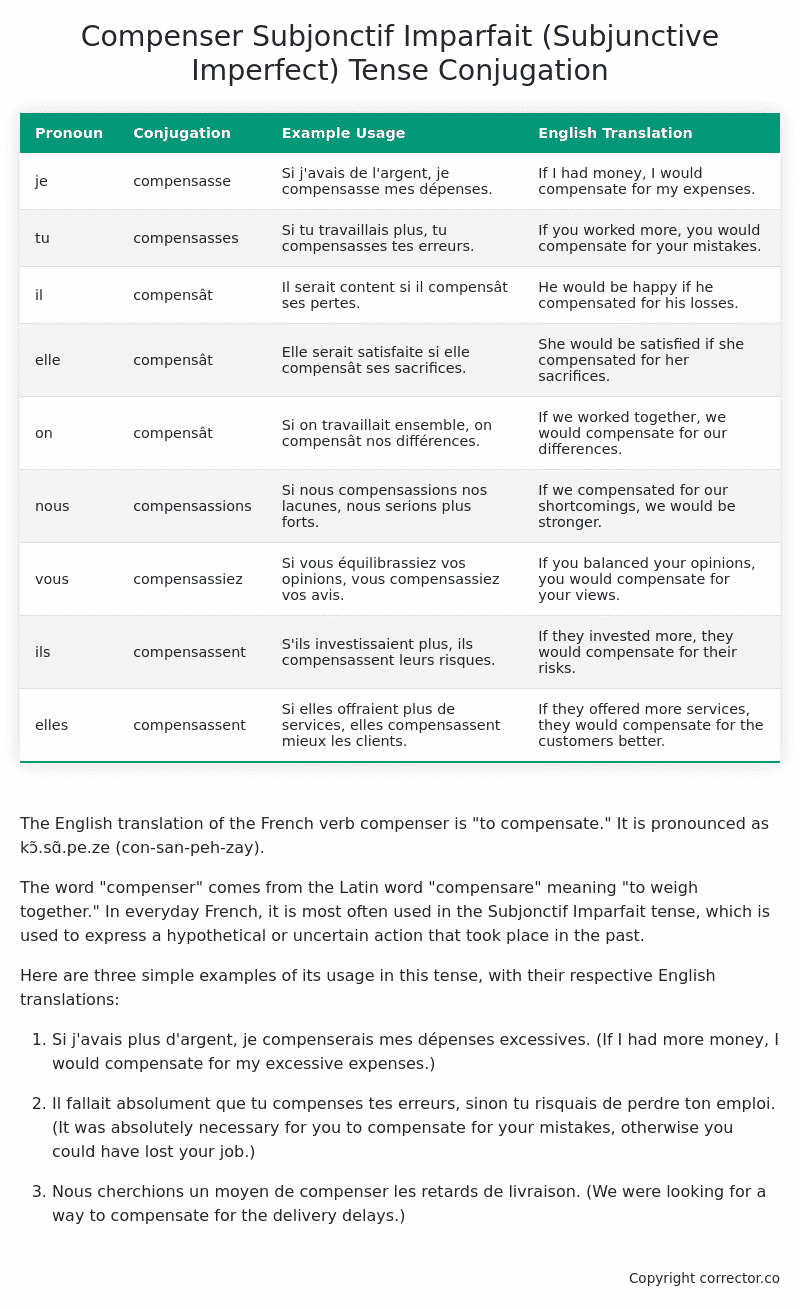Subjonctif Imparfait (Subjunctive Imperfect) Tense Conjugation of the French Verb compenser
Introduction to the verb compenser
The English translation of the French verb compenser is “to compensate.” It is pronounced as kɔ̃.sɑ̃.pe.ze (con-san-peh-zay).
The word “compenser” comes from the Latin word “compensare” meaning “to weigh together.” In everyday French, it is most often used in the Subjonctif Imparfait tense, which is used to express a hypothetical or uncertain action that took place in the past.
Here are three simple examples of its usage in this tense, with their respective English translations:
-
Si j’avais plus d’argent, je compenserais mes dépenses excessives.
(If I had more money, I would compensate for my excessive expenses.) -
Il fallait absolument que tu compenses tes erreurs, sinon tu risquais de perdre ton emploi.
(It was absolutely necessary for you to compensate for your mistakes, otherwise you could have lost your job.) -
Nous cherchions un moyen de compenser les retards de livraison.
(We were looking for a way to compensate for the delivery delays.)
Table of the Subjonctif Imparfait (Subjunctive Imperfect) Tense Conjugation of compenser
| Pronoun | Conjugation | Example Usage | English Translation |
|---|---|---|---|
| je | compensasse | Si j’avais de l’argent, je compensasse mes dépenses. | If I had money, I would compensate for my expenses. |
| tu | compensasses | Si tu travaillais plus, tu compensasses tes erreurs. | If you worked more, you would compensate for your mistakes. |
| il | compensât | Il serait content si il compensât ses pertes. | He would be happy if he compensated for his losses. |
| elle | compensât | Elle serait satisfaite si elle compensât ses sacrifices. | She would be satisfied if she compensated for her sacrifices. |
| on | compensât | Si on travaillait ensemble, on compensât nos différences. | If we worked together, we would compensate for our differences. |
| nous | compensassions | Si nous compensassions nos lacunes, nous serions plus forts. | If we compensated for our shortcomings, we would be stronger. |
| vous | compensassiez | Si vous équilibrassiez vos opinions, vous compensassiez vos avis. | If you balanced your opinions, you would compensate for your views. |
| ils | compensassent | S’ils investissaient plus, ils compensassent leurs risques. | If they invested more, they would compensate for their risks. |
| elles | compensassent | Si elles offraient plus de services, elles compensassent mieux les clients. | If they offered more services, they would compensate for the customers better. |
Other Conjugations for Compenser.
Le Present (Present Tense) Conjugation of the French Verb compenser
Imparfait (Imperfect) Tense Conjugation of the French Verb compenser
Passé Simple (Simple Past) Tense Conjugation of the French Verb compenser
Passé Composé (Present Perfect) Tense Conjugation of the French Verb compenser
Futur Simple (Simple Future) Tense Conjugation of the French Verb compenser
Futur Proche (Near Future) Tense Conjugation of the French Verb compenser
Plus-que-parfait (Pluperfect) Tense Conjugation of the French Verb compenser
Passé Antérieur (Past Anterior) Tense Conjugation of the French Verb compenser
Futur Antérieur (Future Anterior) Tense Conjugation of the French Verb compenser
Subjonctif Présent (Subjunctive Present) Tense Conjugation of the French Verb compenser
Subjonctif Passé (Subjunctive Past) Tense Conjugation of the French Verb compenser
Subjonctif Imparfait (Subjunctive Imperfect) Tense Conjugation of the French Verb compenser (this article)
Subjonctif Plus-que-parfait (Subjunctive Pluperfect) Tense Conjugation of the French Verb compenser
Conditionnel Présent (Conditional Present) Tense Conjugation of the French Verb compenser
Conditionnel Passé (Conditional Past) Tense Conjugation of the French Verb compenser
L’impératif Présent (Imperative Present) Tense Conjugation of the French Verb compenser
L’infinitif Présent (Infinitive Present) Tense Conjugation of the French Verb compenser
Struggling with French verbs or the language in general? Why not use our free French Grammar Checker – no registration required!
Get a FREE Download Study Sheet of this Conjugation 🔥
Simply right click the image below, click “save image” and get your free reference for the compenser Subjonctif Imparfait tense conjugation!

Compenser – About the French Subjonctif Imparfait (Subjunctive Imperfect) Tense
Formation
Common Everyday Usage Patterns
Interactions with Other Tenses
Subjonctif Présent
Indicatif Passé Composé
Conditional
Conditional Perfect
Summary
I hope you enjoyed this article on the verb compenser. Still in a learning mood? Check out another TOTALLY random French verb conjugation!


